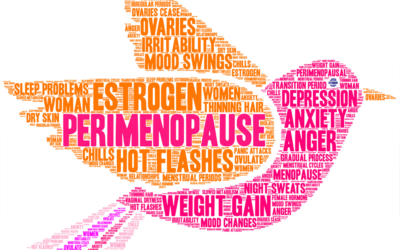

Are You Navigating the Symptoms of Perimenopause?

When I was in my mid-forties I started experiencing a number of seemingly unrelated symptoms – weight gain, brain fog, sore joints, and fatigue. I tried all sorts of one-off fixes – diets, exercise programs, and magic pills – without success. It wasn’t until my period started changing and I experienced hot flashes that the penny dropped and I connected everything to perimenopause. Did it happen like that for you too?
I wonder why there isn’t more talk about perimenopause? After all, it happens to all ladies, although it’s true that some have more challenges with it than others.
Perimenopause (and menopause) is the bookend to puberty, the reproductive part of our lives. So it includes a lot of hormone changes as the reproductive hormones – primarily estrogen and progesterone – naturally decline.
But the real challenge comes with how those changes impact our wellbeing. Like mood swings, inability to sleep, extreme fatigue, joint pain, digestive issues, hot flashes, night sweats, low sex drive and weight gain. What’s up with all that? Why can’t we just wind up our periods and call it a day?
There are two paths for getting help with perimenopause. The medical path and the lifestyle path. Unfortunately, many doctors are not well equipped to help. The American Association of Retired Persons reports most medical schools and residency programs don’t teach physicians in training about menopause. To make matters worse, a recent survey found that just 20% of ob-gyn residency programs provide any kind of menopause training.
When asked, 3 out of 4 ladies reported they did not get adequate treatment when they brought perimenopausal and menopausal concerns to their doctors. And 84% of women say their symptoms interfere with their lives and some are even debilitating.
One of the main areas where doctors should be able to help is in prescribing Hormone Replacement Therapy (HRT). Even though treatment has changed dramatically over the past decade, many doctors are unaware. The new body identical treatment is administered in patches or gel and poses none of the earlier health concerns for breast cancer and heart disease. The topical delivery method means that the liver is completely bypassed, and that absorption through the skin dramatically changes the health risks. Dr. Louise Newson, The Menopause Doctor, goes so far as to encourage women to consider taking body identical HRT for the protections it provides against heart disease, osteoporosis, diabetes and Alzheimer’s.
The other path to get help with the symptoms of perimenopause is through lifestyle. There is a lot that lifestyle habits and behaviors can do to demystify the changes. It turns out the healthy practices of diet and exercise that ladies maintained before perimenopause are unlikely to suit them very well once they enter perimenopause. As our nutrition needs change, so does our digestion. We no longer need all the protein we used to eat, and our sensitivity to sugar and processed foods heightens. Bloating, brain fog, joint pain and weight gain result.
And with hormonal changes to our muscles and joints, the type of exercise and movement that is beneficial also changes. Even if you have always been athletically active, the fatigue and joint pain can make ambitious workouts very difficult. In fact, high impact and anaerobic exercise can cause stress to the system and result in the production of cortisol, the stress hormone. The timing and type of movement you choose take on new importance.
Hormonal changes impact sleep, especially when combined with food choices and stress. So figuring out new sleep hygiene habits are vital to being able to restore the body each night with quality sleep. As we sleep, the body is busy removing dead cells burning fat and rebuilding tissue. The brain catalogues the day’s experiences and builds up memories. Without adequate sleep, the body is stressed when it cannot carry out these maintenance functions and produces cortisol in response. That in turn stimulates appetite, which produces more insulin leading to fat production (and stubbornly stored around the middle). So getting enough good sleep is vital to being able to adapt through the changes of perimenopause.
And finally, mindfulness – getting your head in the game is so important. As it happens, the mind can only focus on one thing at a time. So if you control some of the things you tell yourself and make them positive things, you will benefit from that. Rather than tell yourself that you’re a lazy slob or beat yourself up because you don’t have enough willpower, you tell yourself that you’re an intelligent woman and the goal is achievable. Meditation is a great way to calm the mind, focus on positive things and create endorphins. This can really help to create positivity, reduce cortisol levels and help with sleep.
Are you satisfied with the support your doctor has been giving you for the symptoms of perimenopause? Some symptoms are best resolved using HRT. But many more can be resolved by taking a lifestyle approach.
The beginning of my perimenopausal journey didn’t go well, and I’m determined to help ladies navigate this chapter of their lives so they can take control of the next decades and live their best lives.
To find out how you can navigate the symptoms of perimenopause, click the button to book your free call with Dyna Vink, Health and Nutritional Coach.
Are You Taking Ownership of Your Peri/Menopause?

Though virtually all women experience menopause, it has remained a taboo topic for many women. Hormonal changes during menopause typically bring unpleasant symptoms and indignities: hot flashes, sleep disruption, thinning hair, and vaginal dryness to name a few.
But relatively few women are talking about or addressing their menopause symptoms according to new research from Bonafide, a company that sells products to treat women’s health conditions, including menopause
The State of Menopause Study, conducted with 1,039 women ages 40 to 65 across the United States, showed that nearly one-third (29%) of women never sought information about menopause before they experienced it.
Nearly half (45%) the women surveyed didn’t know the difference between perimenopause—the transitional period leading up to menopause—and menopause itself, the biological process that marks the end of a woman’s menstrual cycles.
One-fifth (20%) of women surveyed had experienced symptoms for a year or more before being assessed by a healthcare provider and 34% had never been formally assessed or diagnosed as menopausal.
Most (73%) women reported that they were not currently treating their menopause, which included hot flashes (16%), weight gain (15%), difficulties with sleep (14%), and night sweats (14%), among others.
Getting through menopause, though, brings a sense of relief. Fifty-nine percent of postmenopausal women reported feeling relieved or happy, compared with 29% of menopausal women and 19% of perimenopausal women.
The Bonafide survey suggests there may also be a generational divide in women’s experiences with menopause. Eighty-four percent of women surveyed said they are not using the same menopause treatments that their mother or grandmother used. Just 9% reported discussing menopause with their mothers.
With the number of menopausal women worldwide estimated to reach 1.1 billion by 2025, the market potential for menopause-related products and services is increasingly hard to ignore.
“The menopause category is finally getting more attention, and quite frankly, the attention it deserves,” said Sarah Foley, partner at SWAT Equity Partners, which has invested in women’s health startups like Womaness, which sells “menopause must-haves.” Foley said she and her partners see more women’s health and wellness opportunities ahead given the size of the population and dollars spent in the category.
The menopause market alone is estimated to be worth $600 billion, but just 5% of women’s health startups—the “femtech” sector—funded in 2019 were focused on menopause.
Not surprisingly, the needs of menopausal women are not necessarily being met.
According to a Female Founders Fund survey from 2020, more than three-quarters (78%) of women surveyed said menopause had interfered with their lives and nearly two-thirds (64%) felt unprepared for menopause. The medical community isn’t necessarily helping; 32% of women surveyed said they feel their doctor isn’t comfortable talking about menopause, causing them to look elsewhere for support.
The days of underinvesting in menopause may be coming to an end. From incontinence product to telehealth services for menopausal women, a range of startups are increasingly tapping into the menopause market. And women are demanding better solutions, according to Foley.
“For menopause in particular, it appears Gen X and older Millennial women are no longer settling for the legacy products—like Depends panty liners—previously available to them and their mothers,” Foley said. “Instead, they are taking a cue from the younger Millennial and Gen Z founder generations that are making waves in this space.”
From Forbes: 73% Of Women Don’t Treat Their Menopause Symptoms, New Survey Shows; By Deb Gordon
#lifestyleapproach #perimenopause #menopause #holistichealth #hormones

Holistic Nutrition Lifestyle | Copyright © 2025 | All Rights Reserved
“This site is not a part of the Facebook website or Facebook Inc. Additionally, this site is NOT
endorsed by Facebook in any way.
FACEBOOK is a trademark of FACEBOOK, Inc.”